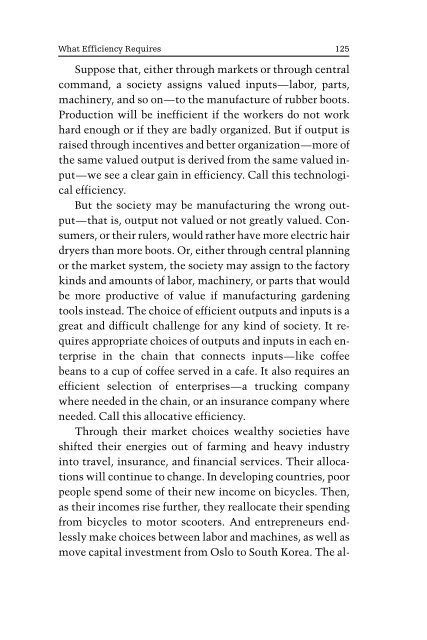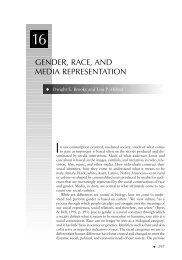- Page 10 and 11:
1Market System AscendantThe massive
- Page 12 and 13:
Market System Ascendant 3abruptly r
- Page 14 and 15:
Market System Ascendant 5other meth
- Page 16 and 17:
Market System Ascendant 7obstructio
- Page 18 and 19:
Market System Ascendant 9seas marke
- Page 20 and 21:
Market System Ascendant 11Yet it mi
- Page 22 and 23:
Market System Ascendant 13in politi
- Page 24:
Market System Ascendant 15But what
- Page 28 and 29:
2Society’s CoordinationHaving pre
- Page 30 and 31:
Society’s Coordination 21one adul
- Page 32 and 33:
Society’s Coordination 23taining
- Page 34 and 35:
Society’s Coordination 25facing a
- Page 36 and 37:
Society’s Coordination 27dination
- Page 38 and 39:
Society’s Coordination 29it is no
- Page 40 and 41:
Society’s Coordination 31to coope
- Page 42 and 43:
Society’s Coordination 33straint.
- Page 44 and 45:
3Market-System CoordinationThe mark
- Page 46 and 47:
Market-System Coordination 37forgot
- Page 48 and 49:
Market-System Coordination 39Take s
- Page 50 and 51:
Market-System Coordination 41linked
- Page 52 and 53:
Market-System Coordination 43induce
- Page 54 and 55:
Market-System Coordination 45under
- Page 56 and 57:
Market-System Coordination 47for co
- Page 58 and 59:
Market-System Coordination 49Diffus
- Page 60 and 61:
Market-System Coordination 51Black
- Page 62 and 63:
Bones Beneath Flesh 532. To broad r
- Page 64 and 65:
Bones Beneath Flesh 55giving—unli
- Page 66 and 67:
Bones Beneath Flesh 57either for an
- Page 68 and 69:
Bones Beneath Flesh 59interchange.
- Page 70 and 71:
5Enterprise and CorporationIn marke
- Page 72 and 73:
Enterprise and Corporation 63“rel
- Page 74 and 75:
Enterprise and Corporation 65call m
- Page 76 and 77:
Enterprise and Corporation 67subscr
- Page 78 and 79:
Enterprise and Corporation 69lenge
- Page 80 and 81:
Enterprise and Corporation 71invest
- Page 82 and 83:
Enterprise and Corporation 73count
- Page 84 and 85: Enterprise and Corporation 75and so
- Page 86 and 87: Enterprise and Corporation 77of by
- Page 88 and 89: Enterprise and Corporation 79fails,
- Page 90 and 91: Enterprise and Corporation 81Retail
- Page 92 and 93: Enterprise and Corporation 83most,
- Page 94 and 95: Maximum Reach 85other, family anoth
- Page 96 and 97: Maximum Reach 87pursuit of nonmater
- Page 98 and 99: Maximum Reach 89Another circular in
- Page 100 and 101: Maximum Reach 91Let us look at each
- Page 102 and 103: Maximum Reach 93Some forms of monop
- Page 104 and 105: Maximum Reach 95task of coordinatio
- Page 106 and 107: 7Chosen DomainWisely or foolishly,
- Page 108 and 109: Chosen Domain 99uted freely rather
- Page 110 and 111: Chosen Domain 101trol of the volume
- Page 112 and 113: Chosen Domain 103objects, although
- Page 114 and 115: Chosen Domain 105the larger ones, m
- Page 116: Chosen Domain 107us well understand
- Page 120 and 121: 8Quid Pro QuoThe market system work
- Page 122 and 123: Quid Pro Quo 113some do not? Why no
- Page 124 and 125: Quid Pro Quo 115I see the visitor t
- Page 126 and 127: Quid Pro Quo 117centives require so
- Page 128 and 129: Quid Pro Quo 119£35 per hour. Ten
- Page 130 and 131: Quid Pro Quo 121the rule: adults wi
- Page 132 and 133: 9What Efficiency RequiresDespite wh
- Page 136 and 137: What Efficiency Requires 127values
- Page 138 and 139: What Efficiency Requires 129The bur
- Page 140 and 141: What Efficiency Requires 131society
- Page 142 and 143: What Efficiency Requires 133lular p
- Page 144 and 145: What Efficiency Requires 135most of
- Page 146 and 147: What Efficiency Requires 137The con
- Page 148 and 149: What Efficiency Requires 139corps o
- Page 150 and 151: Market-System Efficiency 141terials
- Page 152 and 153: Market-System Efficiency 143Motivat
- Page 154 and 155: Market-System Efficiency 145product
- Page 156 and 157: 11InefficienciesSome attributes of
- Page 158 and 159: Inefficiencies 149Enterprises impos
- Page 160 and 161: Inefficiencies 151transferable fish
- Page 162 and 163: Inefficiencies 153At first glance,
- Page 164 and 165: Inefficiencies 155ants only under l
- Page 166 and 167: Inefficiencies 157quently, most ent
- Page 168 and 169: Inefficiencies 159flation. Such par
- Page 170 and 171: Inefficiencies 161petent government
- Page 172 and 173: Inefficiencies 163taxes, transfer p
- Page 174 and 175: Inefficiencies 165ulation. It also
- Page 176 and 177: Too Little,Too Late 167ute income s
- Page 178 and 179: Too Little,Too Late 169sion of the
- Page 180 and 181: Too Little,Too Late 171other societ
- Page 182 and 183: Too Little,Too Late 173In the game,
- Page 184 and 185:
Too Little,Too Late 175in its own p
- Page 186 and 187:
Too Little,Too Late 177moves not to
- Page 188 and 189:
Freedom? 179cloudland of abstractio
- Page 190 and 191:
Freedom? 181The several advantages
- Page 192 and 193:
Freedom? 183(consumer sovereignty).
- Page 194 and 195:
Freedom? 185one proposes not to use
- Page 196 and 197:
Freedom? 187is simply a fact of lif
- Page 198 and 199:
Freedom? 189their alternatives and
- Page 200 and 201:
Freedom? 191I individually may be f
- Page 202 and 203:
14Personality and CultureI do not h
- Page 204 and 205:
Personality and Culture 195tion and
- Page 206 and 207:
Personality and Culture 197munity o
- Page 208 and 209:
Personality and Culture 199frozen a
- Page 210 and 211:
Personality and Culture 201the rule
- Page 212 and 213:
Personality and Culture 203ties. A
- Page 214 and 215:
Personality and Culture 205quacy of
- Page 216 and 217:
Personality and Culture 207ing the
- Page 218 and 219:
Personality and Culture 209efits fo
- Page 220 and 221:
Personality and Culture 211source o
- Page 222 and 223:
Persuading the Masses 213lions. Wit
- Page 224 and 225:
Persuading the Masses 215entreprene
- Page 226 and 227:
Persuading the Masses 217problem is
- Page 228 and 229:
Persuading the Masses 219As early a
- Page 230 and 231:
Persuading the Masses 221also might
- Page 232 and 233:
Persuading the Masses 223fenses of
- Page 234 and 235:
Persuading the Masses 225as are per
- Page 236 and 237:
Necessary to Democracy? 227cratic c
- Page 238 and 239:
Necessary to Democracy? 229market s
- Page 240 and 241:
Necessary to Democracy? 231right, t
- Page 242 and 243:
Necessary to Democracy? 233fend its
- Page 244 and 245:
Necessary to Democracy? 235The mark
- Page 246 and 247:
Enterprise Obstructions to Democrac
- Page 248 and 249:
Enterprise Obstructions to Democrac
- Page 250 and 251:
Enterprise Obstructions to Democrac
- Page 252 and 253:
Enterprise Obstructions to Democrac
- Page 254 and 255:
Enterprise Obstructions to Democrac
- Page 256 and 257:
Enterprise Obstructions to Democrac
- Page 258 and 259:
Enterprise Obstructions to Democrac
- Page 260:
P A R TIIIThinking About Choices
- Page 263 and 264:
254 Thinking About Choicesminate th
- Page 265 and 266:
256 Thinking About ChoicesThe welfa
- Page 267 and 268:
258 Thinking About Choicesprice set
- Page 269 and 270:
260 Thinking About Choicespositive
- Page 271 and 272:
262 Thinking About Choicessumer spe
- Page 273 and 274:
264 Thinking About ChoicesIf we con
- Page 275 and 276:
266 Thinking About Choicesspecial a
- Page 277 and 278:
268 Thinking About Choicespolicy. A
- Page 279 and 280:
270 Thinking About Choicesacknowled
- Page 281 and 282:
272 Thinking About ChoicesSequentia
- Page 283 and 284:
274 Thinking About Choicesman being
- Page 285 and 286:
276 Thinking About Choicesbedrock c
- Page 288 and 289:
NotesChapter 1. Market System Ascen
- Page 290 and 291:
Notes 281low for the inescapable (a
- Page 292 and 293:
Notes 283Chapter 6. Maximum DomainR
- Page 294 and 295:
Notes 285for mutually advantageous
- Page 296 and 297:
Notes 287On the alleged decline of
- Page 298 and 299:
Notes 289Chapter 17. Enterprise Obs
- Page 300 and 301:
IndexAristotle, 28, 200, 204Assault
- Page 302 and 303:
Index 29324; conventional efficienc
- Page 304 and 305:
Index 295Peacekeeping: as coordinat




